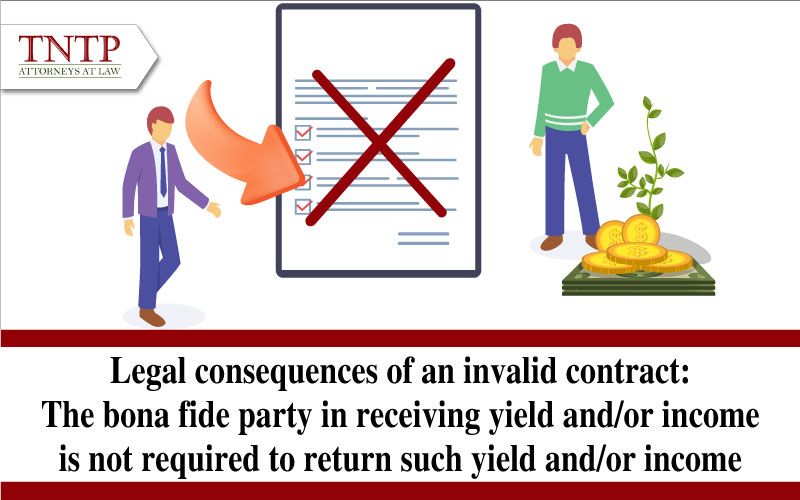Legal consequences of an invalid contract: The bona fide party in receiving yield and/or income is not required to return such yield and/or income

A civil contract may be deemed invalid if it does not satisfy the statutory conditions for validity. In such cases, the parties are obliged to return what they have received and restore the original condition. However, after the transfer of property has taken place, yields (fruits) and income may arise from the exploitation of that property. A key legal question arises: Whether the party receiving the property is required to return the generated yields and income, particularly in cases where that party acted in good faith. This article analyzes the legal implications for the good-faith recipient of yields and income when a contract is invalidated.
1.Definition of Yields and Income
The concepts of yields and income are defined under Article 109 of the 2015 Civil Code of Vietnam (“the Civil Code”).
Specifically, yields refer to natural products derived from a property, independent of human intent. In practice, yields are also known as “fruits of the property” and they may originate from crops, livestock, or other similar sources.
Income refers to material benefits generated from the use or exploitation of property. Income may arise from leasing, investing, conducting business, or other lawful means of utilizing the property. It is important to distinguish income from increased market value of the property due to market fluctuations, as such value increases do not qualify as income in the legal sense. This distinction is particularly relevant when resolving legal consequences of invalid contracts or asset-related disputes.
Illustration: Party A sells an apartment to Party B for VND 3 billion. Party B makes full payment and receives possession of the apartment. Over the course of one year, Party B leases the apartment and earns VND 120 million. Subsequently, the court declares the sales contract invalid. At that time, the market value of the apartment has increased to VND 4.2 billion. When addressing the legal consequences of the invalid contract, the VND 120 million in rental income is retained by Party B as lawful income, while the VND 1.2 billion in market value increase is excluded from compensation.
2.Criteria for Determining Good Faith
The Civil Code does not specifically prescribe criteria for identifying a good-faith party (bona fide party) in the context of yields and income derived from an invalid contract. However, based on general provisions on possession in good faith, one may infer that a good faith party is: A party who has reasonable grounds to believe that they have legal rights to the property being possessed under a valid civil transaction (e.g., believing the contract was legally effective); or A party who did not know and was not obliged to know that their possession of the property lacked legal basis (e.g., unaware that the property being transferred was jointly owned and required consent from all co-owners).
3.Legal Treatment of Yields and Income Received in Good Faith Under an Invalid Contract
In practice, for contracts involving the transfer of property, delivery of the asset often occurs before the contract is declared invalid. During the period of possession, yields and income may arise from the property through natural growth or lawful exploitation. To protect the interests of the good-faith recipient, the Civil Code provides that yields and income obtained in good faith are not subject to restitution upon contract invalidation.
Illustration:
Mr. A enters into a house purchase contract with Ms. B, pays in full, and takes possession of the property. Over two years, he leases the property and earns VND 240 million in rental income. Later, Ms. B’s husband files a lawsuit claiming the property is marital property and that the contract is invalid since only Ms. B signed it without the husband’s consent or authorization. The court declares the contract invalid due to a lack of authority over jointly owned property.
At the time of the transaction, Mr. A neither knew nor was required to know that the property was jointly owned. Ms. B’s name appeared on the Certificate of Land Use Rights, House Ownership, and Other Assets Attached to Land, and she executed the contract directly. Mr. A is therefore identified as a good-faith party. Under Clause 3, Article 131 of the Civil Code, Mr. A is not required to return the VND 240 million in rental income, as it qualifies as lawful income earned during his good-faith possession, despite the subsequent invalidation of the contract.
In civil transactions, parties typically act voluntarily, in good faith, and in compliance with legal regulations to obtain legitimate benefits. However, not all transactions yield expected results, especially when contracts are invalidated due to objective legal deficiencies or factors beyond the parties’ control. In such cases, identifying and protecting the rights of the good-faith party – who entered into and performed the contract honestly, lawfully, and without fault – is essential and consistent with the principles of the Civil Code. Recognizing the good-faith party’s ownership of yields and income derived from the property ensures the stability of civil transactions and promotes fairness in resolving the consequences of invalid contracts.
This article, titled “Legal consequences of an invalid contract: The bona fide party in receiving yield and/or income is not required to return such yield and/or income”, is respectfully provided to readers by TNTP. We hope this article offers practical insights.
Best regards,



